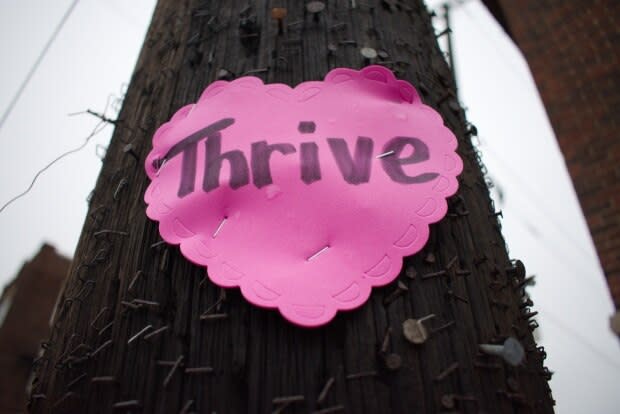How COVID-19 pushed a Hamilton man fighting fentanyl addiction to the brink of relapse
Daniel Schutt says he hasn't touched fentanyl since January, but his worries about COVID-19 have not made it any easier for him to stay away from the drug.
"It's just a smorgasbord of negative emotions that amplifies the want to use, all the negative emotions that trigger wanting to be numb and not feel, exponentially," he said.
"We were moving forward to put our family back together and COVID putting the breaks on that brings back a lot of feelings that got me to start doing fentanyl in the first place."
The pandemic is causing turmoil for some of the city's most vulnerable populations.
Schutt and others living with addiction issues are having to fight harder to stay sober as they try to survive during the pandemic.
Crisis calls 'going through the roof'
There's no data to indicate if drugs are causing more deaths in Hamilton now, but Toronto Public Health said data from the city's paramedic service for March and preliminary figures for April showed a spike in suspected overdoses and deaths.
Nationally, almost one in four respondents in a new report from the Centre for Addiction and Mental Health reported binge drinking during the pandemic.
Seth Fletcher, director of addiction services at the Canadian Centre for Addictions, told CBC News COVID-19 crisis calls are "going through the roof" related to alcohol, opiates and most other substances.
"Prior to this when a person wants to check into rehab, they'll call around and ask questions and compare but we're noticing people calling are in crisis and it's 'How soon can I get in ... things are going downhill pretty quickly for me?' " Fletcher said.
With more isolation, less structure in the day and a sense of anxiety in the air, Dr. Jennifer Brasch, the lead in addiction psychiatry at St. Joseph's Healthcare Hamilton, said there are concerns about more drug use among people battling addiction during the pandemic.
"I deal with one patient at the methadone clinic who is homeless and having a really rough go at things and he said to me, 'I don't want to be sober' and he lapsed into substance use … he said 'Life is so awful, I can't tolerate this.' " Brasch explained.
"If you're homeless and you're not welcome at the shelters and everything is closed and there's nowhere to go and your female partner is not offered one of the hotel rooms and is also homeless, it's a rough go, and I can understand why people check out."
Schutt and his wife also use local shelters, have no home, no family and still feel the need for fentanyl.
Home destroyed by fire
The 39-year-old tattoo artist's life changed in 2008 after he and his wife started misusing Oxycontin prescribed for her chronic back pain.
"She was begging me to die because of how much she hurt. It was understood between the kids and me that mummy's health was one of the most important things in our family," he said.
Schutt knew it could lead to other problems, but "those were all secondary because when you're dealing with that kind of pain … you only have one choice."

Two weeks before Christmas in 2018, an accidental fire destroyed their home near St. Clair Avenue and King Street East. It divided the family, with Schutt moving into a men's shelter while his wife and kids stayed in a different shelter. Soon after, their kids ended up living with Schutt's father in the Niagara region.
That's when Schutt and his wife tried fentanyl for the first time. He said he overdosed 18 times in one month.
"Being homeless immerses you in the drug culture completely. You can't be homeless in this city and not be swimming in a pool of drugs," he explained.
Since then, he has used Hamilton's methadone clinic to beat his addiction and has been clean since January.
Fighting addiction alone
He and his wife have been making progress by keeping each other accountable and regularly visiting the clinics.
"We have the same goal of getting stabilized and getting our family back together," Schutt said.
But now, under quarantine, they are separated for most of the day.
"I can't even sit down inside with my wife and have a coffee. I'm not permitted in shelters where she's at and she's not permitted where I'm at. It's impactful on our life and recovery," Schutt said.
"COVID hit and it put the brakes on all the things in motion to put our family back together."

Brasch from St. Joe's said it's important to stay focused.
"It is a really stressful time and if people have used substances to cope, it is natural to return to former coping strategies. I would encourage people to try and take the longer view as to doing things that are good for their health," she emphasized.
It's hard to know how long the pandemic will last, but Schutt said one thing that will get him and others through is kindness and gratitude.
"Everybody is just a couple of bad months away from where we are. Just be grateful for what you have."


